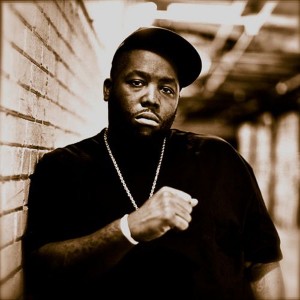WARNING: This is the literature side coming through. Some may find this tedious and boring. But it’s my blog, so…
One of the arguments I’ve been making in my classes and (sometimes indirectly) in my published work is that rap deserves the same kind of serious attention that we readily accord literature. Sure, a lot of rap doesn’t stand up well to close reading, but the same is definitely true for fiction and other literary forms. Pick up a supermarket romance novel with a Fabio-looking guy on the cover and you’ll see my point.
Anyway, one person who’s making my argument easier is Killer Mike. His rhymes sound good, especially over EL-P’s production, but they are often literary as well. I’m not just talking about his use of devices like metaphor, symbolism, etc., which most rappers employ, but his frequent references to literary works. On more than one track in R.A.P. Music, he emphasizes his love of books—at one point saying he’s “addicted to literature”—and it shows. One of the songs I’ve listened to several times is “Anywhere But Here,” which surveys the violence against black bodies that has become a universal fact of American urban life. He opens with “Moving through New York City in a black seven fifty / like Batman moving through Gotham,” a setting that not only matches the dark, heavily synthed backdrop (it actually sounds like it could be a Batman soundtrack) but also sets up his description of the Gotham-like violence he describes—first in New York and then in Atlanta. It also sets him up to be the “hero” who, from the space of his black cars, is going to “peel away” the façade of these cities to reveal their gritty and disturbing undersides. His choice of expensive cars (in the next verse it’s a Mercedes SL) is not just his bowing to rap convention; it’s establishing his wealth and power, allowing him to serve as a counterweight to New York’s “billionaire” Mayor who presides over New York’s inequality and violence. (The blackness of the cars speaks, I think, to the dark deeds in the song, but also the black bodies always seem to be the victims of them—including, as in the case of Atlanta, at the hands of other black men.)
His rhyme scheme throughout is noticeably constant—plenty of internal rhymes, but with particular emphasis on the trailing end-rhyme. The rhyming pattern and cadence stay smooth and even throughout the entire song, a delivery style that lends support to his early claims that he’s moving “gently” and “dodging potholes”–in juxtaposition with the harsh, rough world that “Gotham” and those potholes are setting us up for. In addition, I think Mike’s constant repetition works to reinforce the idea that the violence and self-destructive behavior depicted in the song keep repeating as well. Setting the song in two different cities–and recalling the murder of Martin Luther King–makes this point, too: across time and space, the outcome has been the same.
But the repetition also relates, I think, to the song’s debt to Langston Hughes’s poem “Harlem.” (Harlem is the first neighborhood Mike mentions, just a few lines in, obviously foreshadowing this eventual move to Hughes.) The last verse of the song concludes with “So you ask what happens to a dream deferred / Langston, well it kills itself.” Hughes’s poem—which opens with “What happens to a dream deferred?”—also emphasizes repetition by answering the question with a series of more unanswered questions. It concludes with a final, italicized “Or does it explode?”—a thinly-veiled threat that if people’s dreams are deferred for too long (just as Hughes perpetually defers answering his own question in the poem) there could be explosive violence. I have always read Hughes’s final line as a warning to the people who force those dreams to be forever deferred, but Killer Mike—calling and responding to Hughes—offers a very different reading. For him, the result of deferred dreams is that “young black boys / seem to self-sabotage they selves.” The alliteration in this line is yet another use of repetition that speaks to the ongoing self-destructive consequences of deferred dreams. The dreams don’t explode; they implode.
There’s a lot more that could be done with the song. I haven’t even touched the Emily Panic chorus or the use of a well-known BDP line. But the point here is that Killer Mike is doing a hell of a lot more than making catchy songs over great beats—he’s calling and responding to a wide range of artistic predecessors, in the process making his songs treasure troves of poetic expression. This is what rappers should be doing more of!

